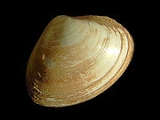
Mactridae
Encyclopedia
Mactridae, also known as trough shells or duck clams, is a family
of marine
bivalve clam
s of the order
Veneroida
.
.
Family (biology)
In biological classification, family is* a taxonomic rank. Other well-known ranks are life, domain, kingdom, phylum, class, order, genus, and species, with family fitting between order and genus. As for the other well-known ranks, there is the option of an immediately lower rank, indicated by the...
of marine
Marine (ocean)
Marine is an umbrella term. As an adjective it is usually applicable to things relating to the sea or ocean, such as marine biology, marine ecology and marine geology...
bivalve clam
Clam
The word "clam" can be applied to freshwater mussels, and other freshwater bivalves, as well as marine bivalves.In the United States, "clam" can be used in several different ways: one, as a general term covering all bivalve molluscs...
s of the order
Order (biology)
In scientific classification used in biology, the order is# a taxonomic rank used in the classification of organisms. Other well-known ranks are life, domain, kingdom, phylum, class, family, genus, and species, with order fitting in between class and family...
Veneroida
Veneroida
The Veneroida or veneroids are an order of bivalve molluscs. They include some familiar forms such as saltwater clams and cockles, and a number of freshwater bivalves including zebra mussels....
.
Characteristics
Trough shells burrow in sand or fine gravel and never in muddy substrates. They have two short siphons, each with a horny sheath. The shell is shaped like a rounded-cornered equilateral triangle and there is a slight gape at the posterior. Each valve bears two cardinal teeth with four lateral teeth on the right valve and two on the left. The foot is white and wedge-shaped. They mostly inhabit the neritic zoneNeritic zone
The neritic zone, also called coastal waters, the coastal ocean or the sublittoral zone, is the part of the ocean extending from the low tide mark to the edge of the continental shelf, with a relatively shallow depth extending to about 200 meters...
.
Genera
- Anatina Schumacher, 1817
- LutrariaLutrariaLutraria is a genus of medium-sized marine bivalve mollusks or clams, commonly known as otter shells. They live buried in sand to a depth of about , usually below low water mark, with their siphons extended to the sea bed...
Lamarck, 1799 - LongimactraLongimactraLongimactra is a genus of large marine bivalve molluscs or clams, in the family Mactridae.-Species in the genus Longimactra:* Longimactra elongata -References:...
Finlay, 1928 - MactraMactraMactra is a genus of medium-sized marine bivalve mollusks or clams, commonly known as trough shells or duck clams. Mactra is the type genus within the family Mactridae....
Linnaeus, 1767 - Mactrellona
- Mactromeris Conrad, 1868
- Mactrotoma DallW. H. DallWilliam Healey Dall was an American naturalist, a prominent malacologist, and one of the earliest scientific explorers of interior Alaska...
, 1894 - MuliniaMuliniaMulinia is a genus of bivalve mollusks or clams.-Species:* Mulinia cleryana* Mulinia coloradoensis - Colorado Delta clam* Mulinia edulis* Mulinia lateralis* Mulinia pallida...
Gray, 1837 - Raeta Gray, 1853
- RangiaRangia (genus)Rangia is a genus of bivalve mollusks or clams in the family Mactridae.-Species:* Rangia cuneata - Atlantic rangia* Rangia flexuosa - Brown rangia...
Desmoulins, 1832 - Resania Gray, 1852
- Scalpomactra Finlay, 1928
- Simomactra DallW. H. DallWilliam Healey Dall was an American naturalist, a prominent malacologist, and one of the earliest scientific explorers of interior Alaska...
, 1894 - SpisulaSpisulaSpisula is a genus of medium-sized to large marine bivalve mollusks or clams in the family Mactridae, commonly known as triangle shells or surf clams.-Species:Species in the genus Spisula include:...
Gray, 1837 - Tresus Gray, 1853
- ZenatiaZenatiaZenatia is a genus of medium-sized marine bivalve molluscs or clams in the family Mactridae.-Species in the genus Zenatia:* Zenatia acinaces * Zenatia zelandica Gray-References:...
Gray, 1853

